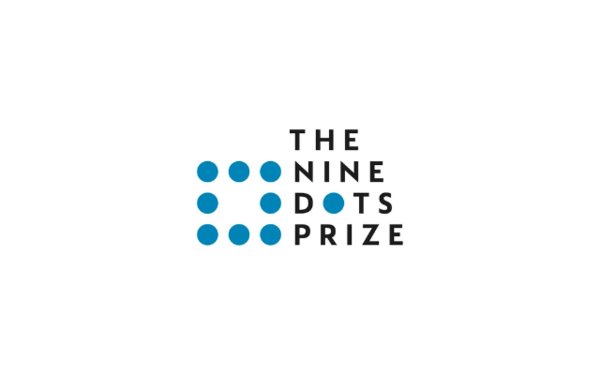News and Events
Nine Dots Prize question launched
Nine Dots Prize launches this year's question plus new additions to the Board

The fifth cycle of the Nine Dots Prize launches with a new question and additions to the Board including Dr Linda Yueh CBE, Dr Thomas Halliday and its first-ever winner, Dr James Williams.
The Nine Dots Prize has revealed the next question in its global problem-solving competition, which will see one person awarded US$100,000 and a book deal with Cambridge University Press for the best 3,000-word response.
For its 2024/25 cycle, the Nine Dots Prize asks:
‘Is data failing us?’
With each cycle lasting two years, this fifth edition continues to promote outside of the box thinking, as the Prize’s name suggests, seeking original responses that engage with the most significant issues of our time. The Prize is judged entirely anonymously and welcomes submissions from established writers and emerging thinkers alike, including those who have not been published before.
Entrants can be based anywhere in the world, provided they are writing in English, and must respond to the question in an essay no longer than 3,000 words. They will also submit an outline detailing how they would expand their arguments into a short book of between 25,000-40,000 words, supported by relevant research and evidence. The winner will receive editorial support from Cambridge University Press as well as the opportunity to spend a term at the Centre for Research in the Arts, Social Sciences and Humanities (CRASSH), at Cambridge University, to help develop their ideas before completing their book manuscript.
A Board of internationally recognised and distinguished academics, authors, journalists and thinkers will judge the Prize, with no knowledge of the careers, locations or backgrounds of those who have submitted. This year, the judges include the journalist and broadcaster, Milica Momcilovic; the lawyer and writer Petina Gappah; and leading essayist and publisher, Urvashi Butalia.
Three new members join the Board for this cycle. They are the economist, writer, and Executive Chair of the Royal Commonwealth Society, Dr Linda Yueh CBE; Honorary Associate of the Natural History Museum, palaeontologist and evolutionary biologist, Dr Thomas Halliday; and technology ethicist and the first Nine Dots Prize winner, Dr James Williams. The Board is chaired by Professor Simon Goldhill, Professor in Greek Literature and Culture and Fellow of King's College, Cambridge.
Professor Goldhill said: “The ambition of the Nine Dots Prize has always been to find the most exciting free thinkers who can challenge our perceptions of the world and current issues, wherever they may be, and regardless of whether they have had their work published before. Our most recent winner, Joanna Kusiak, and her book, Radically Legal: Berlin Constitutes the Future, embody this spirit of creativity and original thinking. We now look forward to starting our search again, with a question that is as intriguing as it is globally relevant. Alongside my fellow board members, I am excited to see how our applicants will tackle it.”
The Nine Dots Prize is open to anyone worldwide aged 18 years or over, but submissions must be in English. Entries must be submitted via the online submission form by midday (GMT) on 27 January 2025. The winner will be announced in May 2025.
For more information, submissions guidance and to enter the Nine Dots Prize, visit http://www.ninedotsprize.org/ and follow the Prize on Twitter @NineDotsPrize.
Joanna Kusiak, winner of the Nine Dots Prize 2022/2023
“Entering the Nine Dots Prize empowered me to go for what I’d secretly wanted to do — and to do it as well as I could. Winning it empowered me to never stop, to remember that the only work worth doing is the work of love. For me, this means breaking the boundary between academic writing and poetry, ditching jargon, and thinking big. The support from partners like CRASSH and Cambridge University Press was vital. If you’re thinking of applying for 2024/25, go all in — wholeheartedly!”
Nine Dots Prize winning books
Stand Out of Our Light
'Stand Out of Our Light: Freedom and Resistance in the Attention Economy' by James Williams was chosen as Princeton University’s 2019 Pre-read, sent to all incoming students as an introduction to intellectual life at Princeton.
Bread, Cement, Cactus
'Bread, Cement, Cactus: A Memoir of Belonging and Dislocation' by Annie Zaidi was described by The Observer as a ‘compelling exploration of the intimate and political sides of an itinerant life.’
Soro Soke
'Soro Soke: The Young Disruptors of an African Megacity' by Trish Lorenz was praised by author Chibundu Onuzo, who said: “I wish this book existed when I was writing Welcome to Lagos. Trish Lorenz has done an excellent job of collating the hopes, dreams and frustrations of the young people of Lagos.”
Radically Legal
'Radically Legal: Berlin Constitutes the Future' by Joanna Kusiak examines the power of radical politics to revive the rule of law and sheds light on the ways democracy operates on the boundary between fiction and reality.
